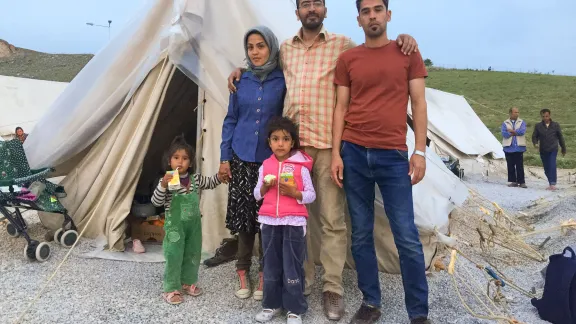
An Afghan refugee family in a Greek refugee camp, 2015. Photo: LWF/ J. Schreier
Regional inter-religious conference to protect children on the move
(LWI) - “Faith actors have a key role to keep the moral compass of Europe in check.” Rev Dr Sivin Kit, LWF Program Executive for Public Theology and Interreligious Relations, alluded to the treatment and situation of children on the move – migrants and refugees who are under age.
Two weeks before the Christian world celebrates a God who comes into the world as a refugee child, a two-day conference “From faith to action“, brought together faith-based organizations such as The Lutheran World Federation (LWF), and the United Nations Children’s Fund (UNICEF), the UN agency for the protection of children, as well as and religious leaders from different faith communities In the sessions, the organizations explored the protection concerns for migrant children in Europe and Central Asia, and the special value which faith organizations can bring for the children.
The conference took place online and was hosted by UNICEF Europe and the Central Asia Regional Office (ECARO). It was co-organized with the World Council of Churches (WCC), the Joint Learning Initiative on Faith and Local Communities (JLI) and the European Council of Religious Leaders, in collaboration with Islamic Relief Worldwide, A World of Neighbours, LWF and World Vision International.
Caring for people on the move
More than 51,000 children needed humanitarian assistance in Europe and Central Asia last year around Christmastime, UNICEF statistics say. This year, the images from the Moria reception camp in Greece raised awareness about the living conditions of refugees arriving in Europe. A lack of water and sanitation, health care and schools, together with violence and exploitation are but some of the issues endangering the health and the development of children, arriving alone or with their families.
“Long before there was a UNICEF, religious communities were among the greatest advocates for the world’s neediest children, providing guidance, aid and comfort to millions of disadvantaged families,” UNICEF states in their introduction to the event. “Today, religious communities continue to be important partners for UNICEF’s work to advance children’s rights and enhance their well-being.”
Long before there was a UNICEF, religious communities were among the greatest advocates for the world’s neediest children, providing guidance, aid and comfort to millions of disadvantaged families.
The successful integration of refugee and migrant children into national life in their host countries was one of the main topics of the conference. Related to this, organizations debated how to protect migrant children against stigmatization and xenophobia.
“Various religious leaders, faith-based organizations and religious communities shared practices that gave us a perspective on how children are cared for in their contexts,” said Rev Dr Sivin Kit, LWF Program Executive for Public Theology and Interreligious Relations, who moderated and facilitated two sessions on combating xenophobia and fostering social cohesion with colleagues from Islamic Relief Worldwide and World Vision.
Reshape the public narrative
“We heard about many inspiring examples of how different faith communities were working on the ground to welcome children in host communities. Yet there were also stories of struggle where they do not have sufficient knowledge and support in caring for children and families on the move.” Kit added. “One of the many good recommendations was to raise faith literacy and cultural awareness of host and migrant communities.”
Among the challenges mentioned was to improve the representation of young refugees and their needs, and countering hostility. “Positive messages and engagement often are neglected by traditional media. We all need to reclaim social media to reshape the public narrative around refugees and migrants,” Kit emphasized.
The conference will inform a plan of action with recommendations for UN agencies, national and local governments, as well as faith actors and the wider civil society. As a next step, UN organizations, faith communities and policy makers will set up a plan of action which allows in more effective and coordinated responses.
“Migrant children are a blessing and an opportunity for Europe”, Jean Duff of the Joint Learning Initiative on Faith & Local Communities (JLI) concluded.
LWF/ C. Kästner
LWF through its diaconal arm, LWF World Service, serves 2.3 million refugees, IDP and their hosts worldwide. One third of them, about 600,000 are children. Support our work.


